Friday, February 25, 2005
Harambee Means Pull Together
So we as a school community chanted today...Harambee!
Deas (with chains in hand) spoke passionately of the hardships of the past, the challenges of the future and also provided us with a one woman act...the woman was Harriet Tubman. She walked like I think she would have walked. She talked like I think she would have talked and she shook like I thought she would have shook when she was crying out for her life and the lives of so many others. This actresses' reenactment of the real life Harriet Tubman was exceptional! Students learned how one woman named "Moses" took people to freedom. Students learned that dreams should never be compromised. And lastly, students learned the importance of the people who helped lay the frame work of the place they call home.
Deas was very inspirational today and donated to the school a book called African-American Wisdom A Book of Quotations and Proverbs from Courage Books. Wow! Reading these quotes, and seeing the pictures I found as gripping as the performance today. Thanks Dr. Deas.
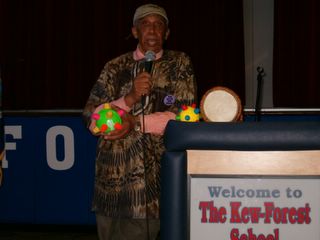
Dr. Deas speaks about slavery and the importance of making sure we eat healthy foods.
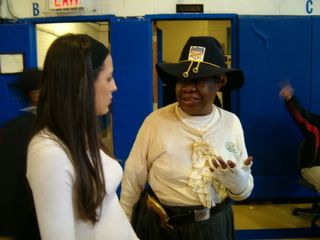
Student Reporter interviews actress playing Harriet Tubman
Wednesday, February 23, 2005
Art History Inspires Her
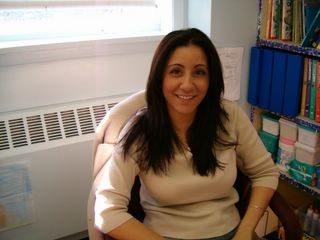
Ms. Denise Morello
From Scratch Art to Jackson Pollack to even Egyptian Sarcophagus...art is making a huge splash at K-F thanks to Ms. Morello our teacher of the week.
Morello has been inspiring K-6 students to be self-driven and to learn the important lesson that "every form of art originated from an artist." Her bulletin boards are a visit back in time. Morello teaches the historical component of art and the vitality of each piece is a testament to the awesome vision she has brought to life through her love of print making, which she describes as "A Giant Stamp Rolling Out." Recently, after working on an interdisciplinary project with the 6th grade history team, Morello was very pleased with the Egyptian recreations of the sarcophagus. You will also find Morello teaching students about: abstract expressionism, Matisse cut outs or by carefully recreating art by using yarn.
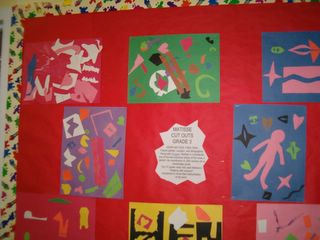
Matisse Cutouts

Jackson Pollack's Expressionism Through The Eyes of a Kindergartener
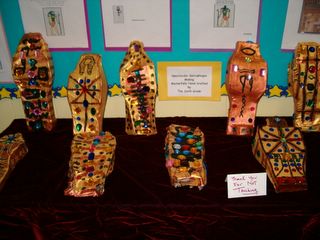
6th Grade Egyptian Tombs
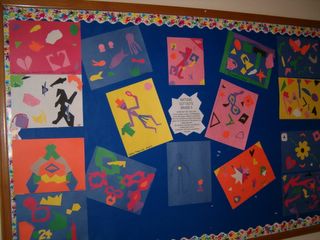
Grade 3 Matisse Cut Outs
Tuesday, February 22, 2005
Alternative Scoring Guide
Copyright © (2001) North Central Regional Educational Laboratory, a wholly owned subsidiary of Learning Point Associates. All rights reserved. Reprinted with permission.
Teach Students To ASK First
(the following my fabicated solution to the students who wrote the "tasteless letters")
Soldiers receive letters from some Brooklyn students with some very well thought out questions re: the war in Iraq.
Then the questions could be "reporter like" in tone. What is your job description as a soldier? It's being reported that Mosques are being burned down? What is the most difficult aspect of your job? Do you ever feel bad about the happenings in Iraq? Why?
It seems more productive to teach students to GATHER the facts, ASK the right questions and WRITE their answers, before jumping to conclusions about a topic discussed in class. You also now have to teach the students that, while they are making news, at what cost? They cannot undo what's been done.
Friday, February 18, 2005
New School/Parson School of Design Answers K-F Student's Question
Here are a few answers Professor Macklin provides our seniors:
"The kind of work we are doing in our classes ranges from computer animation to broadcast design, game design, website design, mobile phone interfaces and applications, digital video, and much more. You can see some of our work on our website: http://dt.parsons.edu
Our students can teach you how to create animation and effects for your broadcasts, as well as show you some professional tools for live broadcast design (it's called viz rt, and is used by ABC, CNN, and most major netowrks)
We have about 150 graduate and 125 undergraduate students interested in broadcast design. They also have the opportunity to study interactive design, game design, physical computing and animation in addition to broadcast.
Students spend anywhere from 2 weeks to a year on projects here. Year-long projects are called "thesis", and is the final project for seniors. We'll show you some when we come out there!
Students do work in real-world, collaborative environments and with deadlines that could be thought of as "stressful" - but - it's still school, and we encourage students to experiment, have fun and make mistakes - we think that's the best way to learn."
To see the full blog post visit Ask The Parsons/New School Experts
Thursday, February 17, 2005
See Current Events Article on K-F
Wednesday, February 16, 2005
All The Way From Picardie
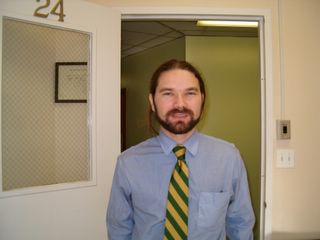
TRANSLATE, THINK, SPEAK FRENCH....Thanks To Cyrille Martins, our
K-F teacher of the week who comes to us from Picardie, France. Cyrille teaches french to grades K-6 and one of his passions is being able to "immerse our the children in the french language by speaking to them in his native language." He also does this by using songs like La Jument de Michao and Arlequin simulations, games and other online activities. Cyrille teaches using an active vs. academic approach to learning by having the students conduct the classes in the upper grades and interacting with the lower school students. Both of my children are in Cyrilles' class and they went from speaking virtually no french to now singing, talking and watching the french version of Shrek. Here are some helpful french links and we are very fortunate to have a such a creative and native speaker on campus.
Learning French Colors
Hide and Seek French Word Search
French Alphabet
Tuesday, February 15, 2005
Assistive Technology
Adrian can't walk or speak or use any of his limbs. But the 11-year-old can control the movement of his eyebrows, and so, amazingly, he can communicate.
"It took us three years," says Adrian's teacher, George Rehmet, of the amount of time they spent trying to locate a place on Adrian's body that would allow him to communicate with using a computer. This particular computer has pictures tailored especially for Adrian: photographs or pictures of friends and family, including his baby sister, Alexis, and pictures or words depicting situations or events he would like to write about, such as the weather, trips with family, and meal preferences.
As educators, we should share with our students that everyone can benefit from technology. They may have family members who are disabled or they themselves may need assistance in schools. There's so much available we have to be the mouth pieces for the people who need them.
I linked to this article from another helpful resource Technology Information Centers for Administrative Leadership (TICAL)out of Santa Cruz.
Sunday, February 13, 2005
I Want To Go To The Summit
You probably think my post title is about reaching the heights of the educational plateau...Not.
I really want to attend the Leadership Summit held right here in New York City from
March 18-19; not that I am an innovative thinker but that's my day job. Anyway, "The goal of the summit is to challenge 200 of the nation's most innovative thinkers to come up with a dynamic action plan that addresses three core areas - literacy, student achievement, and 21st century learning skills" a quote from Evan St. Lifer, the editor at School Library Journal in his recent article Literacy Skills Are in Vogue. I am sure most schools who integrate technology and information need to capitalize on the proficiencies being acquired. Increased connectivity has made computer literacy a major part of the school curriculum. Today more and more teachers are encouraging students to use technology during their learning. This new emphasis on technology in student learning demands answers to a number of questions relating to parent attributions associated with the computer literacy of their child(ren). For example, "Is the technology at my child's school adequate"? "Is the use of technology in my child's school correlated with my child's use of technology at home"? I will examine the opinions of parents toward technology in their child's school...this is a quote from the Informed Insight: Parental Attitudes toward Technology article By Clyde Winters. thanks to Educational Technology Ray Schroeder, editor)
And waiting until a student is in college to teach information literacy is almost too late. I had a discussion with a library specialist at the New York Public Library and she found a lack of incoming students fully understanding how to research and assess information. And according to St. Lifer there's now a Summit in place to start the process for schools to consider adopting. "The good news is that the education community is now acknowledging that information-literacy skills are a fundamental building block in a student's ability to acquire knowledge. The bad news is that the library community is not an active participant in ETS's new test or a major player in the Partnership for 21st Century Learning initiative. I find this ironic, considering that information-literacy skills form the philosophical backbone of both projects."
This is very good news and I would love to be there....just to take blog notes. Where there's a will there's a way.
An Ounce of Prevention
1. Decide carefully if you want to create a public space for your ideas with your name on it. Maybe going anonymous would be better. There are a couple of great anonymous teacher blogs out there, Hipteacher among them.2. When you write, assume it will be read by the very people you may not want to read it. Think about the consequences.3. As much as possible, blog on your own time with your own equipment.4. Tell the truth. If you can't, don't write.5. Ask people's permission before you write about them in your blog, especially if it revolves around some struggle that you might feel worth reflecting upon or sharing with your audience. 6. If you do use a blog for professional reflection or opinion, my personal wish is that you take the time to present those ideas well. I'm not perfect when it comes to misspellings or errors, but I try to read everything at least twice if not three times before publishing.7. Start simple, and find your groove. If you just post about news and don't add much in the way of commentary at the start, it will give you time to develop your voice.8. Again, if you decide to blog openly, don't try to hide that fact from peers or supervisors. 9. If you think people may have an issue with your blog, ask first, and make your decisions based on the feedback you get.10. If you find yourself looking over your shoulder, don't blog.
I almost didn't post about this, out of fear of the unknown (pioneers never get where they're going easily) but it's a "teachable" moment; so I thank Tom and Will. And here's my 2cents...if teachers use the same professionalism they use in the classroom, blogs will continue to be used creatively and educationally. Occasionally, you will have someone making poor choices when it comes to blogs or any other venue. Just like in class you will have some students making poor choices; my advice when teaching about blogging begins with common sense and to continue to focus on the students. Once your focus turns away from the students and on to your own agenda problems will arise.
Friday, February 11, 2005
A Diverse Taste Of Queens
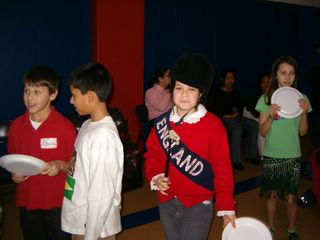
Today our K-6 students and parents celebrated diversity with a bell performance, food, dance and songs. It was truly a day to share our uniqueness at The Kew-Forest School. Here are some thoughts shared from Dr. Peter Lewis (our Head of School) to our families..."Today is a celebration of diversity in the world around us and particularly within our school community. It is a joy to observe the children before us today in their native costumes enjoying the food and the music of lands beyond the United States. And at last count 63 different countries from all across the world are being represented here today. Diversity is indeed a matter of celebration and today we take pride in the vastness of the world and its accompanying representation in this room."

Here are some flags of the world...thanks to our students who worked on these with their art teacher Ms. Morello.
LibraTech Online
Wednesday, February 09, 2005
The Year of the Rooster
Chinatown Lunar New Year Firecracker Ceremony Date: Wednesday, February 9, 2005 Time:11AM - 5PM Location: Intersection of Mott St. & Bayard St. Firecrackers at noon Intersection of Market St. E. Broadway Firecrackers at 2PM.
Meet...The Other Amy

This week's teacher profile is our Libra/Tech Teacher & Supervisor Amy Bourdet. While, she wears many hats at K-F her main role is to integrate digital information into the K-6 curriculum; while working collaboratively with the classroom teacher. You will also find her mending the internal workings of the hardware, checking out laptops on our library Athena system, or just being a good role model for our students. I don't think there is anything Amy cannot do....I mean it. If you take a look at Amy's Online Folder you will find grade appropriate lessons and links for lower school students on just about any subject. Also...note Amy's superior organizational skills. This morning I watched Amy with the fourth graders during her keyboarding practice session for 10 minutes and then onward to today's activity which was math practice/review.
Thanks Amy.
Tuesday, February 08, 2005
A Post From The Math Blogosphere
Monday, February 07, 2005
So Why Is There A Blog Clog?
I also think that trust has to be an educational objective in a world that is constantly changing. This lack of trust I am now calling...CLOGS. These educational CLOGBLOGS haven't evolved past the trust factor. But I really believe that people who are currently fearful of "what a blog is" have never really handled well the "email" or "webpage era" or better yet the video/tv integration in the classroom era; yet (ask them) how are we doing now? They also realized (later on) that there is an understanding of how these tools can impact the education of a student and probably helped promote it; but they had to "play the devils' advocate." We owe these people thanks because they are now (once again) the naysayers and the fact checkers who make sure these options have to be better than good. Not to mention, they have to go through screening and possible deferment. We owe these cloggers many thanks because ultimately they teach our students to not just take any wooden nickel.
So, here's another scenario worth contemplating...A very advanced/gifted first grader wants to write, wants to type and very much wants to be published (not a far fetched thought). Do you tell the student...Wait, we are not there or ready yet! We haven't heard from the naysayers yet!" And If blogs are a way of bringing classrooms closer, why should we wait until everyone catches up? There are so many people who "make hay while the sun shines." While others wait for the sun to shine. It is more important for students, staff and administrators to forget what is clogging the educational pipes and move into the century we are in with innovative opportunities for our students to be able to fully understand the world they are living in. Blogs allow for this to happen. Here is my push...it pays for students take ownership of their own work. Imagine administrators and students setting the framework for companies to resemble? It's happening already and my hope is that educational institutions continue to set the trend on how the future visionaries will take the 21st century student. The sky is the limit....unless there is a sky blogger.
Blogging and School Administrators Blog...written by other admin and "higher-ups."
This is a great initiative because these are the people who will un-clog the blog. Enjoy....
Sunday, February 06, 2005
Examine The Changes After Tsunami
Calm After the Storm Examining Changes in Sri Lankan Society in the Wake of the Tsunami Grades: 6-8, 9-12 Author(s)Michelle Sale, The New York Times Learning Network
Javaid Khan, The Bank Street College of Education in New York City
This is a wonderful way to tie in all of the schools who are conducting tsunami donation drives and have it make sense for students.
An Online Toolkit for Parents
Now, what has struck me during my research in preparing for this night is how little there is available for parents. Students, yes. Professionals, yes. But for parents, much of the online resources revolve around "How To Protect Your Kid in Cyberspace." Or, the, Let's Beat Up The BigBad Internet Wolf. As parents we definitely need to protect our children from online predators; but there's so much more out there. I'm convinced that if parents are "in the know" and learn the wonders of the Web, they too can be digital guides for their children.
If we (School Technology Leaders) don't do it, who will? Most parents are NOT in school during the day...they're out working. So schools need to reach out and share the TechKnowledge.
Saturday, February 05, 2005
Paper Waster and Yes I am Guilty
Anyway, back to paper waster, Iona college has a link off of their home page called Paper Conservation Campaign with tips for the people like me who advocated a paperless classroom but cannot seem to bring it to fruition. It is certainly a goal worth pioneering and appreciating at the college level.
Here's a blurb from the Iona College website.
The "paperless office" promised by the computer revolution has not materialized. In fact, annual consumption of office paper has nearly doubled since 1980, and it represents one of the fastest-growing components of the nation's waste stream. Here at Iona, we have observed a dramatic increase in the use of paper in copiers, printers and computer labs. Preliminary research revealed that much of this usage may be unnecessary or accidental (e.g., one-sided copying instead of back-to-back; printing more pages or copies than expected, etc.).
The WRITE Way
" wrote about this on The Write Weblog but I want to share this good news with even more people. Yessenia is one of the fifth grade students who is a part of our blooming webloggers group. She submitted one of her poems to the Anthology of Poetry and it has been accepted for publication!"/strong>
Can you imagine how excited this young girl feels? Also, if blogging was around when I was in school I would have had print copies of the many years in school. That's okay, at least this generation, BY WRITING, will have documentation they will never forget. Nice Job Yessenia!
Friday, February 04, 2005
For The Love Of Reading
Wednesday, February 02, 2005
Meet Senora Martinez - Spanish Poetry Online

This week I am profiling a Kew-Forest school Spanish teacher Senora Martinez. At least once a week you will find technology integration and ingenuity in her Spanish classroom. In one of her more recent online tasks she assigned her students a Spanish Poets Project using online translation sites. Once the students finished researching their work, and compiling their poet's background information, she had them read the poetry in spanish aloud; very innovative. Lastly, each of the students provided a citations page and bibliography for this report.
A MUST See
"Source: New York Public Library's Schomburg Center for Research in Black CultureNew Web Resource: In Motion: The African-American Migration ExperienceFrom the news release, "...the groundbreaking new Web site makes accessible to the general public more than 16,500 pages of essays, books, articles, and manuscripts, 8,300 illustrations, 100 lesson plans, and 60 maps that will help users understand the peoples, places, and the events that have shaped African America?s migration traditions of the past four hundred years."
Good Teachers Are Born NOT Made
Tuesday, February 01, 2005
Black History Month Resources-Courtesy of PBS Ed ONLINE
Broaden your students' understanding of African-American history by using lesson plans created by Ed Online: * Celebrating Women: Toni Morrison http://www.thirteen.org/edonline/lessons/morrison/index.html * Paul Robeson: 20th Century Renaissance Man, Hero In Any Century http://www.thirteen.org/edonline/lessons/robeson/index.html * Black History Stamps http://www.thirteen.org/edonline/lessons/stamps/index.html * I Have a Metaphor http://www.thirteen.org/edonline/lessons/mlk/index.html For more lesson plans go to www.thirteen.org/edonline and choose "Lesson Plans" from the "Quick Links" list on the left; then select a subject area.
ChessEd. 101
Anyway, in one of my recent posts on Grandmaster Susan Polgar I shared Polgar's website information on how the game of chess helps students advance academically. So now that I have been researching the "The Wonderful World of Chess" I can't tell you how much is out there...educators need to be aware of. So I will start by thanking the Boylston Chess Club Weblog: optical chess illusions, Classroom revolution as chess puts a check on unruly children
Please feel free to send any chess articles or links that demonstrates how schools are using chess in education. Here at Kew-Forest, we have a small after school group that meets once a week but wouldn't it be great to offer chess in the curriculum? I think I have just found my next curriculum project proposal.
February Resources
Special Days Calendar for February 2005
http://www.edhelper.com/teachers/februarysample.htm
Groundhog Day
http://www.groundhog.org/
Links For Black History Month
http://www.nypl.org/digital/blackculture.htm
http://www.infoplease.com/spot/bhm1.html
http://edition.cnn.com/EVENTS/black_history/
http://www.galegroup.com/free_resources/bhm/
http://www.kidsdomain.com/kids/links/Black_History.html
Chinese New Year Activities (year of the rooster)
http://www.enchantedlearning.com/crafts/chinesenewyear/
http://www.activityvillage.co.uk/chinese_new_year.htm
http://www.verybestkids.com/Categories/CraftsActivities/LearningFun/Article.aspx?articleID=3875DE04-85CD-41DC-8675-E782498B13C1 (for teachers)
http://www.activityvillage.co.uk/chinese_zodiac_game.htm (Printables)
http://www.underfives.co.uk/yoroostr.html#year of the rooster
http://www.abcteach.com/china/bookmarks2.htm (bookmarks)
http://www.abcteach.com/directory/theme_units/social_studies/china/chinese_new_year/
http://www.kiddyhouse.com/CNY/cnyclips/cnyboy.gif
http://www.dltk-kids.com/t/china/bcalendarwreath.html (cut outs)
http://www.123greetings.com/events/chinese_new_year/happy/
http://www.kathimitchell.com/chinewyr.html
Valentine's Day Links
BEE Mine
http://www.abcteach.com/directory/theme_units/month_to_month/b_february/valentines_day/
Valentine Lesson Ideas
http://www.lessonplanspage.com/Valentines.htm
February Theme Units
http://www.edhelper.com/February.htm
Valentine Coloring pages
http://www.teacherhelp.org/holidays.htm#valentines
Presidents Day Link
http://www.kidsdomain.com/holiday/presday.html
Games in Education
I found some Creative Computing projects at The Reignhead Primary School's web page. This site contains links to all the computer games that the students made in their computer club.
There's also a site called Game Learning with many links and resources for teaching how to make computer games.
A week ago I asked some students if this is something they would be interested in pursuing. One student blurted out "Ms. Bowllan, you know how much money we could make if we made a computer game?!" How could I argue with that.

